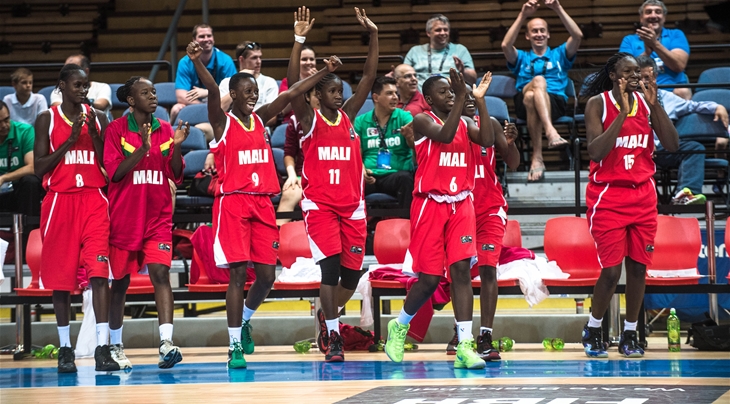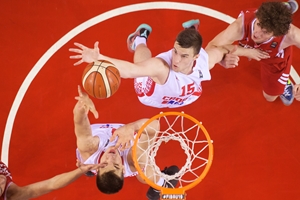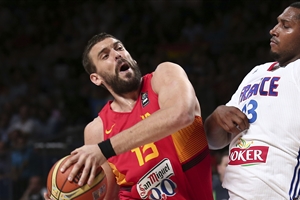
Chasing Mali's glory at U16 AfroBasket
SHEFFIELD (Julio Chitunda's African Message) - The biennial AfroBasket Women U16 is back this week, and Mali is clearly the team to beat.
The tournament will take place from 10 to 19 July in Antananarivo, Madagascar, and the two finalists will qualify for next year's FIBA U17 World Championship for Women.
J-7 avant l'ouverture officielle de l' #Afrobasket U16 Filles 2015 Telma, partenaire N°1 du Sport à #Madagascar pic.twitter.com/ktc5uLpeKI
— Telma Madagascar (@GroupeTelma) July 3, 2015
But, the unanswered question, so far, is whether or not Mali can extend their continental dominance for much longer.
Mali, the winner of the last two editions of the tournament, and Egypt, who finished runners-up twice in a row, have dominated the continental scene, and may repeat their triumphant journeys if their opponents insist on using unworkable strategies.
Two years ago. Mali finished unbeaten in six games, sweeping their opponents by record winning-margins, proving a gigantic disparity between their basketball programmes to countries such as Gabon and Botswana.
In that tournament, Mali proved to be far too superior for most of their opponents, trouncing Botswana 116-6 (yes, you read it right) on the opening day of the 2013 FIBA Africa U16 Women's Championship, before adding misery to Gabon with a 138-12 victory.
Those two results should serve as a wake-up call to this year's contenders if they are to avoid humiliation and demoralisation.
Here is the difference between Mali, Egypt and the rest of the teams.
While they often come up with athletic and smart players, and Egypt make the basketball basic fundamentals their strongest assets, teams such as Angola and Mozambique - the two closest contenders - tend to dash out their chances when it matters most.
For Mali, it makes no difference playing in Bamako or elsewhere. They travel around Africa to win the whole thing, just as it happened in 2013 when they demolished hosts Mozambique 83-37 in the Semi-Finals.
I feel Mali are capable of extending their glory days at this year's African U16 tournament in Madagascar.
However, this is set to be one of the most competitive tournaments ever, considering the record number of teams expected to taking part in it.
While no more than eight teams have participated in the last two editions of the event, this year 11 of them - Angola, Egypt, Mali, Madagascar, Morocco, Mozambique, Nigeria, Rwanda, South Africa, Tunisia and Zimbabwe - have confirmed their presence.
If all goes as planned and no team withdraws at the last minute, then Madagascar fans - some of the biggest basketball enthusiasts in Africa - can get ready for the party.
Lu dans le journal Midi #Madagasikara : "#Afrobasket Women U16 : La présentation des joueuses" http://t.co/0e94TPqzCg Alefa #Madagascar!
— Telma Madagascar (@GroupeTelma) July 3, 2015
Two notes caught my attentions though.
First, it's great to see the return of Nigeria to Africa youth competitions after a six-year absence.
Second, it is refreshing to feel that basketball seems to have reached the youth and its popularity could become a reality in countries such as hosts Madagascar, Rwanda, Morocco, Tunisia and Zimbabwe, who will make their debuts in the tournament.
Nevertheless, both Mali and Egypt have been the bearers of the African flag in the world stage, where their results and performances need to be as much ambitious as they show in Africa.
But, by beating Italy at the 2014 FIBA U17 Women's World Championship - the first time an African national team defeated a European counterpart in the competition - Mali have sent a message of their potential.
To accomplish their glory at the Africa U16s seems to be the dream of many, thus, only time will tell whether or not they can succeed again.
Julio Chitunda
FIBA
FIBA's columnists write on a wide range of topics relating to basketball that are of interest to them. The opinions they express are their own and in no way reflect those of FIBA.
FIBA takes no responsibility and gives no guarantees, warranties or representations, implied or otherwise, for the content or accuracy of the content and opinion expressed in the above article.





















